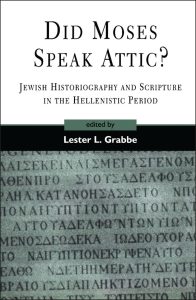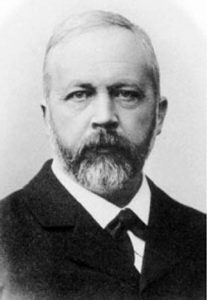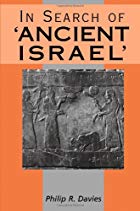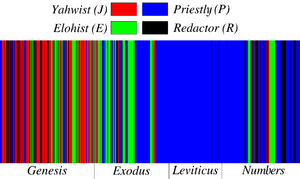Since I don’t expect to have much time to write new posts again before the end of the year, I will from time to time copy what I once posted on another forum in defence of Russell Gmirkin’s thesis dating the Old Testament books to the Hellenistic era.
The orthodox view is that biblical books about the Exodus, wilderness wanderings, Joshua, David, the various kings and prophets originated in the time of the historical kingdoms of Israel and Judah, even as early as the era of David and Solomon, circa 900 BCE. What became part of the Old Testament started to take on a recognizable shape after the Kingdom of Judah went into Babylonian captivity around 600 BCE. “By the waters of Babylon” Jews pining for their homeland devoutly penned much of what became their sacred literature, and on their return under Persian rule and intermittent efforts to rebuild their Jerusalem temple, circa 500-400 BCE, the “Jewish Bible” began look more like what it is today. That, more or less, has long been the conventional view of scholars.
The Hellenistic era refers to the period following Alexander the Great’s conquest of the Persian Empire, from circa 300 BCE. It marks the spread of Greek cultural and political influence across Asia Minor, the Near East, and Egypt, extending as far as the borders of India, and lasting until the Roman annexation of these regions.
If these biblical writings were composed so late, a host of other questions inevitably arise, especially in relation to the historical information they seem to contain, their source materials, and even why they were written and the kind of relationship they have to the origins of Judaism.
 In 2001 there was published a chapter, written by Niels Peter Lemche:
In 2001 there was published a chapter, written by Niels Peter Lemche:
- Lemche, Niels Peter. 2001. “The Old Testament—A Hellenistic Book?” In Did Moses Speak Attic?: Jewish Historiography and Scripture in the Hellenistic Period, edited by Lester L. Grabbe, 287–318. Sheffield, England: Bloomsbury T&T Clark.
I discussed that chapter in a 2010 post: The Old Testament – A Hellenistic Book? (and other digressions)
Russell Gmirkin took up the idea and closely analyzed the early books of the Old Testament in the light of Greek literature. (Attic was the Greek dialect of much of Classical and Hellenistic Greek literature.) Detailed discussions of Russell’s work are linked in my earlier post, Russell Gmirkin. So the Hellenistic thesis per se is not exclusively Russell Gmirkin’s, but it seems fitting to acknowledge the particular contribution of Russell at this time.
In place of regular original posts for coming months, I would like to post some of my defences of the Hellenistic thesis for dating the Old Testament books. These defences were posted on the earlywritings forum (in its “Academic Discussion” section) but I chose to delete them from there after I lost all confidence in how that forum was run by the moderator. (Russell demonstrated far more patience there than I could muster.)
Since Russell’s sudden passing some of his critics have returned there to rebut his work without having the honesty to acknowledge and address earlier answers to their criticisms. Therefore, I have decided to repost my own defences of the Hellenistic hypothesis here in a series of posts.
I must add that I could not help but find myself at times in disagreement with some of Russell’s lesser points. These differences arose from our different ways of approaching historical sources. I seem to recall, for example, that Russell did not date “all” of the biblical books in the Hellenistic era. He placed one or two of them in the Persian period. I disagree, as I did on some other issues with Russell. But I believe the core of my argument in defence of the Hellenistic thesis remains solid. At least until others can demonstrate its flaws in method, logic and evidence.
Why the Hellenistic era for ALL “Old Testament” books should be taken seriously
When we apply the fundamentals of historical methods as practised by historians in fields other than biblical studies we quickly see logical flaws at the heart of the conventional understanding that the sources for various biblical books (in particular the stories in Genesis and Exodus) go back as far as the times of David and Solomon.
Multiple sources and circularity
Several times I have engaged in EarlyWritings on the question of the Documentary Hypothesis and every time, it seems to me, the argument submitted to “prove” the validity of the DH has been a point by point demonstration of how multiple sources were combined to create a new single story: e.g. how two different narratives were combined to compose the story of the great flood in Genesis. Each time I have attempted to make it clear that I have no doubt that different sources were mixed to create the Genesis Flood account, but a pre-Hellenistic antiquity of the biblical flood story does not logically follow from the fact of such a mix.
Biblical scholars, it is no secret to anyone, not even to themselves on the whole, do have interests that go beyond pure historical research. Even Julius Wellhausen, to whom we tend to attribute the modern notion of the “Documentary Hypothesis”, has been criticized for allowing his Protestant (anti-legalistic) bias to subconsciously influence his model of the “Documentary Hypothesis”. (The criticism has been directed at the notion of “legalistic” texts being a latecomer addition to the original narratives found in the biblical canon.)
When hypotheses become facts

So much in biblical studies that pass for facts are actually hypotheses. But they are repeated so often it is hard to notice that they have no basis in the hard evidence. Look at this passage from Wellhausen:
With regard to the Jehovistic document, all are happily agreed that, substantially at all events, in language, horizon, and other features, it dates from the golden age of Hebrew literature, to which the finest parts of Judges, Samuel, and Kings, and the oldest extant prophetical writings also belong,the period of the kings and prophets which preceded the dissolution of the two Israelite kingdoms by the Assyrians. About the origin of Deuteronomy there is still less dispute; in all circles where appreciation of scientific results can be looked for at all, it is recognised that it was composed in the same age as that in which it was discovered, and that it was made the rule of Josiah’s reformation, which took place about a generation before the destruction of Jerusalem by the Chaldaeans.
That’s from Wellhausen, Julius. Prolegomena to the History of Ancient Israel. His assertion of relative dating is grounded entirely in scholarly consensus, not in the evidence itself.
The Documentary Hypothesis, it has been pointed out by at least one scholar in the biblical field, might well never had got off the ground had the Elephantine remains — indicating that Persian era Jews knew nothing of the Pentateuch — been discovered earlier and had more time to gain traction and wider and more focused attention than it had before the time of Wellhausen’s work.
None of this is to say that biblical scholars are unprofessionally “biased” or “unscholarly”. Of course they are scholarly and their biases are generally known and admitted and taken into account. But their work tends to be picked up by others and over time taken for granted as fact.
Independent evidence is critical
The fact remains that there is no independent evidence that the OT was composed prior to the Hellenistic era. That datum alone does not prove it was a Hellenistic product. But it does at least allow for the theoretical possibility that it was created in the Hellenistic era, and given that our earliest independent evidence for a knowledge of the Pentateuch is situated in the Hellenistic era, it is entirely reasonable to begin with that era when searching for the Pentateuch’s origins.
It also is a fact that scholarship has only cursorily (by comparison) considered assessing the evidence within the Pentateuch itself with Hellenistic literature and thought. Those are facts. Another fact is that Documentary Hypothesis is not without its inconsistencies and problems.
Those facts do not prove that the Pentateuch was created in the Hellenistic era. But they do at least make it possible to ask the question. It makes it all the more necessary for anyone proposing an earlier date to ground their reasons in supporting independent evidence of some kind.
The meaning of “Hellenistic”
The Hellenistic provenance of the Pentateuch does not deny any use of pre-Hellenistic literature or sayings or concepts. Hellenization even means a uniting of Greek and Asian cultures, not a replacement of one by the other. So one should expect in any Hellenistic era hypothesis for the creation of the Pentateuch clear allusions to non-Greek (i.e. local Canaanite and Syrian) sources. Merely pointing to evident instances of Ugaritic or Syrian influence in the OT does not, per se, contradict a Hellenistic origin for the OT.
 The fateful year of 1992
The fateful year of 1992
My own understanding of the history of the scholarship in this area tells me that the floodgates to a more widespread acceptability towards questioning the “deep antiquity” (pre Persian era) origin of any of the OT books were opened by Philip R. Davies in 1992 with his publication of In Search of Ancient Israel. The irony was that Davies was only collating various criticisms and doubts about the conventional wisdom of “biblical Israel” and its “bible” that had been available to scholars for some decades. But by bringing these questions and doubts all together in one short publication (only about 150 pages of discussion) Davies’ work started something of an academic “kerfuffle”. Davies himself argued at length for a Persian era provenance of many of the OT books, but those who followed the evidence he set out could see that the way was also open for an even later period. Some scholars identified stronger links between the Pentateuch and Primary History (Genesis to 2 Kings) and Hellenistic literature than to anything earlier. One French scholar has even argued that the entire Primary History was composed by a priest in the Hasmonean era.
Davies certainly established the circularity of the arguments that much of the OT literature was composed in the times of King Josiah and the Babylonian captivity. He also brought together the archaeological evidence not just for the absence of a united kingdom of Israel but the archaeological evidence that indicates the very notion of “biblical Israel” is as fanciful as King Arthur and Camelot.
The basics of historical inquiry
I opened this post with a reference to the methods of historians in non-biblical fields. In short, those methods are nothing other than any journalistic or forensic or “common sense” method of trying to find out “what happened” — minus the theological provenance from which the quest is embarked upon. Start with what we know to be the most secure “facts” on the basis of collating independent evidence and working from there. Unfortunately, our cultural heritage has taught us too well that certain narratives about the past are “facts” (or at least based on facts) so that we find it very difficult to remove these from our minds when trying to see clearly the material evidence before our eyes.
Change is very often a generational thing. It happens as the new ideas are embraced by the new students who are less emotionally and intellectually committed to the old ideas.
by neilgodfrey » Sun Feb 18, 2024 6:58 pm
(images were not part of the original)
The above post met with some criticism and I will post that along with my response next time.







 Niels Peter Lemche has a chapter in Lester Grabbe’s
Niels Peter Lemche has a chapter in Lester Grabbe’s